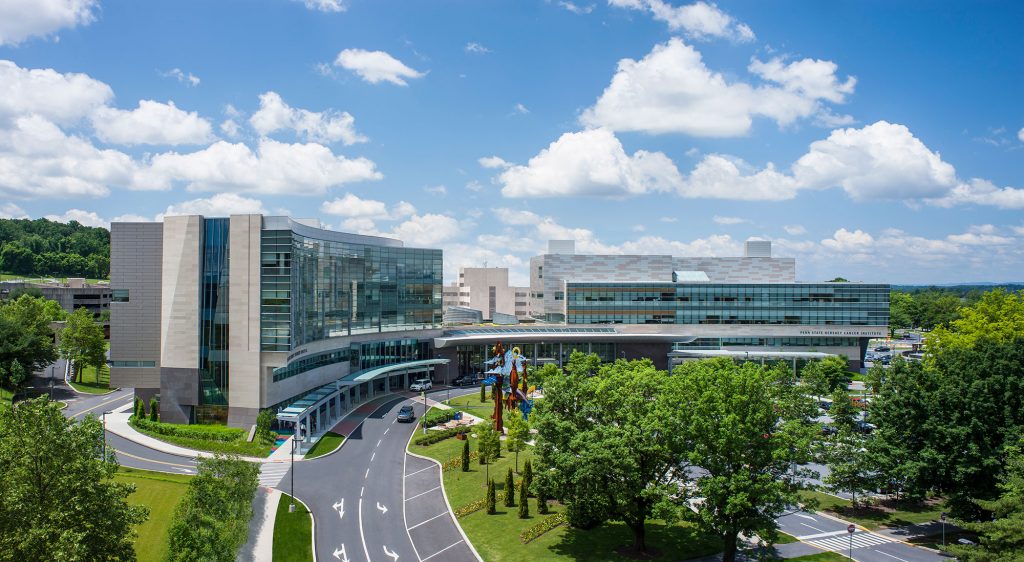Jump to topic
Search
Program Details
The mission of the Interdisciplinary Addiction Medicine Fellowship is to train the next generation of leaders who can provide the highest quality of medical care for the prevention and treatment of substance-use disorders.
The program also strives to increase the medical work force capable of providing interprofessional, integrated primary care and specialty care for substance-use disorders to medically underserved and vulnerable populations.
The Interdisciplinary Addiction Medicine Fellowship at Penn State Health Milton S. Hershey Medical Center is designed to be a one-year program, with an option to continue for a second year for those candidates who wish to pursue an academic career and are interested in doing addiction-related research.
The program’s vision is to reduce overdose deaths, improve capacity and access to treatment and promote a substance-free population of children, adolescents and adults in central Pennsylvania.
The fellowship is open to all candidates who are board-certified or board-eligible in a primary medical specialty of:
- Emergency medicine
- Family and community medicine
- Internal medicine
- Obstetrics and gynecology
- Pediatrics
Learn More about the Fellowship
Greetings prospective applicants,
We are delighted you are interested to learn more about the Interdisciplinary Addiction Medicine Fellowship at Penn State Health Milton S. Hershey Medical Center. Our goal is to train the next generation of addiction medicine specialists to:
- Provide excellent, independent care for people living with addiction
- Function as health-systems-aware advocates for improvement in care delivery and public health
- Advance the status of addiction science
- Teach the broader community the value of compassionate addiction care
- Develop skills practicing in interprofessional teams
To realize this goal, we have brought together an outstanding faculty with expertise in addiction medicine, pediatrics, internal medicine, family and community medicine, emergency medicine, pain medicine, obstetrics and gynecology and pharmacology, practicing in a variety of inpatient and outpatient settings. Not only will you have the opportunity to work with and learn from a dynamic group of clinicians and scholars, but you will also benefit from a didactic curriculum that provides a foundation in the biology of substance-use disorders, the medical and psychosocial complications of these disorders, their treatment, research methodology, clinical ethics and clinician wellness.
We recognize that most substance-use disorder care is provided in the community, not the university setting, so you will also train and learn at community sites that offer a wide range of outpatient and residential medical and behavioral care. Your work in the fellowship will equip you to care and advocate for children, adolescents and adults living with substance-use disorders across urban, suburban and rural settings.
By applying to a fellowship in addiction medicine, you are acknowledging your desire to care for an often-marginalized population deserving of high-quality, ethical and compassionate care. Beyond that, you are acknowledging your own humanity, kindness and adaptability, the essential qualities of an addiction medicine provider.
We look forward to meeting you.
Sheryl A. Ryan, MD
Program Director
Bhavna Bali, MD
Associate Program Director
General Application Information
All applications must be submitted through ERAS.
ERAS opens for applications in July and the application review process begins mid-July, so applicants are encouraged to apply early.
The Addiction Medicine Fellowship participates in the National Residency Matching Program (NRMP) Medicine and Pediatric Subspecialties Match, with typically two-four fellowship spots per year. All applicants must have completed a residency from an ACGME-certified training program.
COVID-19 Update for the 2023 Interview Season
In accordance with national recommendations and in fairness to all fellowship candidates, many of whom are under travel restrictions, in-person visits and interviews will be suspended for the 2023 interview season. All fellowship interviews will be conducted virtually via conferencing software. Fellowship candidates are encouraged to pay close attention to ERAS and NRMP calendars for this season, which may be different than prior years, and adhere to all deadlines to ensure a successful match.
Eligibility
Qualified candidates will be:
- U.S. citizens, permanent residents or J-1 visa holders (no additional visa types are sponsored)
- Board-eligible or board-certified in family and community medicine, emergency medicine, internal medicine, obstetrics and gynecology or pediatrics
- Eligible for a Pennsylvania medical training license
Required Supporting Documents
The following documents should be uploaded to ERAS for review:
- ERAS application, including current photograph
- Personal statement
- Curriculum vitae
- USMLE or COMLEX transcript
- ECFMG certificate (if applicable)
- Four letters of recommendation, including one from current program director
International Students
International medical graduates must hold a currently valid certificate from the Educational Commission for Foreign Medical Graduates (ECFMG) to be considered for the match. The program accepts J-1 visas only.
Interview Process
Applications will be reviewed once the ERAS application is complete. Qualified applicants will be invited for an interview. All applications are considered without regard to race, religion, gender or national origin.
Virtual Tour
Penn State Health
Penn State Health is a multi-hospital health system serving patients and communities across 29 counties of Pennsylvania. Its mission is to improve health through patient care, research, education and community outreach.
In December 2017, the system partnered with Highmark Health to facilitate creation of a value-based, community care network in the region. The shared goal of Highmark and Penn State Health is to ensure patients in the community are within:
- 10 minutes of a Penn State Health primary care provider
- 20 minutes of Penn State Health specialty care
- 30 minutes of a Penn State Health acute care facility
Learn more about Penn State Health

Penn State Health Children’s Hospital (left), Penn State Health Milton S. Hershey Medical Center (center) and Penn State Cancer Institute (right)
Penn State Health Milton S. Hershey Medical Center
500 University Dr., Hershey, Pa., 17033 (Derry Township, Dauphin County)
- The health system’s 647-bed flagship teaching and research hospital
- The only medical facility in Pennsylvania accredited as both an adult and a pediatric Level I (highest-level) trauma center
- Dedicated surgical, neuroscience, cardiovascular, trauma and medical intensive care units
- Accredited Life Lion critical-care transport providing more than 1,100 helicopter and approximately 750 ground ambulance transports per year
- More than 1,300 faculty members and more than 650 residents and fellows
- Approximately 29,000 admissions, 73,000 emergency department visits, 1.1 million outpatient visits and 33,000 surgical procedures annually
- Designated as a Magnet hospital since 2007
Learn more about Milton S. Hershey Medical Center
Penn State Health Children’s Hospital
600 University Dr., Hershey, Pa. 17033 (Derry Township, Dauphin County)
- An eight-story, 263,000-square-foot-facility built in 2013 and expanded in 2020
- 146 licensed pediatric beds, 18 acute care beds and a 56-bed neonatal intensive care unit
- Level IV (highest-level) neonatal intensive care unit
- Level I quaternary (highest-level) pediatric intensive care unit
- Level I (highest-level) pediatric trauma center designation
- Intermediate care unit
- Dedicated pediatric operating rooms
- More than 150,000 pediatric outpatient visits and approximately 5,000 pediatric patient discharges annually
Welcome to Hershey
More About Hershey
Interested in learning more about living and working in Hershey, Pa.? See details here:
Wellness, including emotional, spiritual, social and physical health, is a crucial component to training and to becoming a professional, compassionate and resilient physician. Self-care is a skill which must be continually practiced and reinforced. Penn State College of Medicine and Penn State Health are committed to addressing wellness among residents and fellows, with multiple resources readily available.
Institutional resources
- Visit BeWell – a health program designed to support Penn State Health employees
- See Penn State College of Medicine wellness resources here
- Employee Health Care Concierge and Case Management Service
- Partners in Medicine
Moving to a new city with your family does not have to be stressful. Residency programs have assisted many significant others with finding employment. There is also a GME-Wide Partners in Medicine (PIM) group that offers networking opportunities as well as various social and community oriented activities. - The Doctors Kienle Center for Humanistic Medicine
- Active and easily accessed Office of Professional Mental Health
Graduate medical education resources
Institutional Resources
Penn State Health and Penn State College of Medicine celebrate, embrace and support the diversity of all patients, faculty, staff, students and trainees.
Office for Diversity, Equity and Inclusion
In keeping with this, Penn State Health has an active Office for Diversity, Equity and Inclusion with various programs, networks and resource groups, including:
- Talks and lectures on diversity, equity and inclusion through the Inclusion Academy
- Regular events on topics such as eradicating racism and creating a culture of inclusiveness
- Many Business Employee Resource Groups (BERGs), including:
- Disability Business Employee Resource Group
- Interfaith Business Employee Resource Group
- LGBTQ+ Business Employee Resource Group
- Military and Veterans Business Employee Resource Group
- Multicultural Business Employee Resource Group
- NextGen Business Employee Resource Group
Learn more about the Penn State Health Office for Diversity, Equity and Inclusion
Learn more about the College of Medicine’s Office for Diversity, Equity and Belonging
Office for Culturally Responsive Health Care Education
The vision at Penn State College of Medicine and Penn State Health is to equip learners with the knowledge, skills and attitudes they will need to provide culturally excellent health care and research for an increasingly diverse U.S. population. The Office for Culturally Responsive Health Care Education was formed to help meet that goal.
Learn more about the Office for Culturally Responsive Health Care Education
Office for a Respectful Learning Environment
In addition, the institution does not tolerate discrimination, biases, microaggression, harassment or learner mistreatment of any kind, and any concerns are immediately addressed by the Office for a Respectful Learning Environment.
Learn more about the Office for a Respectful Learning Environment
Network of Under-represented Residents and Fellows
The Network of Under-represented Residents and Fellows (NURF) is a group of diverse residents and fellows representing all specialties. NURF’s goal is to promote cultural diversity in the residency programs through community involvement, mentorship with diverse faculty, professional networking and support for the recruitment of diverse medical students into the residency programs.
NURF is sponsored by the Penn State College of Medicine Graduate Medical Education Office and the Penn State Health Office for Diversity, Equity and Inclusion.
General Contact Information
Curriculum Details
Clinical rotations will include inpatient experiences at:
- Penn State Health Milton S. Hershey Medical Center addiction and pain management
- Consult-liaison services and residential programs at the Caron Institute and Gaudenzia in Harrisburg
- Outpatient rotations and a continuity clinic including:
Electives will be available depending upon each fellow’s interest and are designed to provide clinical experience in the areas of:
- Emergency medicine
- Obstetrics and gynecology
- Pain medicine
- Pediatrics
A rigorous core didactic curriculum is part of the weekly schedule. In addition, a one-month elective in research is available to all fellows.
- Pennsylvania Psychiatric Institute
- Pennsylvania Psychiatric Institute – Opioid Treatment Clinic – 36 weeks (120 hours)
- Continuity Clinic – 48 weeks (208 hours)
- Lebanon VA Medical Center
- Mental Health Residential Rehabilitation Treatment Program – 12 weeks (288 hours)
- Mazzitti and Sullivan
- Adult IOP Program – Adolescent IOP/PHP Program – 4 weeks (32 hours)
- Caron Treatment Center
- Adolescent Residential – 4 weeks (64 hours)
- Adult Residential – 4 weeks (64 hours)
- Gaudenzia Concept 90
- Adult Residential – 4 weeks (80 hours)
- Adult & Teen Challenge Pennsylvania – 8 weeks (96 hours)
- Sadler – 12 weeks (96 hours)
- Blue Prints – 4 weeks (64 hours)
- Penn State Health Milton S. Hershey Medical Center
- Consult-liaison service (required) – 16 weeks (256 hours)
- Inpatient pain service (required) – 16 weeks (128 hours)
- Women’s health service (elective) – 18 weeks (80 hours)
- Adolescent medicine clinic (elective) – 16 weeks (48 hours)
- Outpatient pain service (elective) – 18 weeks (80 hours)
- Emergency medicine (elective) – 16 weeks (160 hours)
- Scholarly activity – 4 weeks (128 hours)
- Core lecture series – 48 weeks (192 hours)
- OBAT (Internal Medicine Primary Care Clinic) – 4 weeks (48 hours)
- Vacation/continuing medical education – four weeks (must total at least 160 hours)
Latest News from Addiction Medicine







